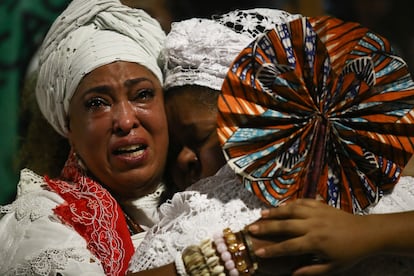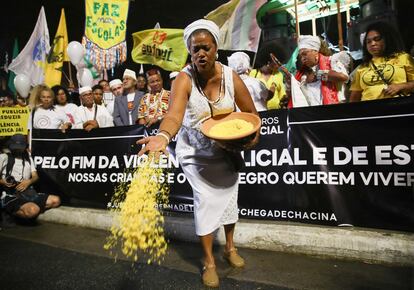The murder of priestess Mãe Bernadete and the rise of the ‘holy war’ against African religions in Brazil
Over the past two years, there has been a 45% increase in attacks fueled by religious intolerance. According to specialists, this is related to the surge of evangelical fundamentalism

Maria Bernadete Pacífico, 72, was an institution in Salvador de Bahía, in northeastern Brazil, where she was known simply as Mãe Bernadete. She was a respected quilombola leader (a community formed by the descendants of slaves who fled their masters) and ialorixá — a priestess of Afro-Brazilian religion Candomblé.
For years, Bernadete had been fighting for the territorial integrity of her quilombo, located on the outskirts of Salvador and coveted by loggers and land speculators. A few weeks ago, two gunmen invaded her terreiro — the sacred place where ceremonies are held — and shot her dead. Six years earlier, her son was killed. Investigators have pointed to the agrarian conflict as the main cause of the murder, but haven’t ruled out religious motives.
Crimes due to religious intolerance have grown in Brazil in recent years. According to the most recent data from the Ministry of Human Rights, cases have increased by 45% in the last two years. Last year, 113 complaints were filed, although the government acknowledges that this number may be higher, as many of these crimes are still considered to be fights between neighbors. The incumbent government also accuses the previous administration of Jair Bolsonaro (2018-2022) of dismantling the system that facilitated these types of complaints.
The crime of religious intolerance ranges from extreme cases — such as murder or daily assaults — to insults, threats and other types of discrimination for religious reasons. The latter offenses can result in sentences ranging from two to five years in jail. In Brazil, those who suffer the most from religious intolerance are the practitioners of African-based religions, such as Candomblé, Umbanda and Quimbanda.
Sidnei Nogueira is a babalorixá — a male priest — and runs a terreiro on the outskirts of São Paulo. Those who frequent the temple are accustomed to dealing with discrimination. During the ceremonies, bead necklaces, white clothes and turbans are used, which — in certain areas and among certain Christian sects — can be seen as demonic. He tells EL PAÍS by phone that to protect his “filhos de santo” (his faithful), he has had to build some sinks and a closet in the space so that the clothes can stay there.
“Some [practitioners] have neo-Pentecostal parents; if they’re seen carrying those things, they’re kicked out of the house. They practice their religion in secrecy. On the other hand, [the evangelicals] display their Bible and the crucifix all the time… but we have to hide, in the middle of the 21st century,” he laments. Nogueira — who holds a PhD in Semiotics from the University of São Paulo and has written a book on religious intolerance — supports the usage of the term “religious racism,” because most religious attacks in Brazil are directed against faiths that are seen to be linked to the Black community.

Brazil — an extremely religious country — is still the largest Catholic country in the world, with more than 108 million followers. However, evangelicals have been growing exponentially in recent years and are expected to be the majority by 2032. Although it’s a heterogeneous group, with hundreds of different denominations, there are tensions with Catholics (because of their veneration of images, which they consider to be paganism) and especially with Afro-Brazilian religions. One of the theoretical origins of this growing feeling of rejection dates back to 1997, when Bishop Edir Macedo — of the powerful Universal Church of the Kingdom of God — published a book in which he accused Afro-Brazilian religions of being “demonic sects,” and Africa of being a cursed continent. Today, that church even has its own political party, with 43 congresspeople.
On the other hand, religions with African roots represent only 0.3% of the Brazilian population. It’s a small minority, consisting of mostly Afro-Brazilian worshipers, who discreetly practice their faith in favelas and along the peripheries of cities, while evangelical churches multiply at a dizzying rate, with about 14,000 being opened each year.
Coexistence isn’t easy. In marginal neighborhoods, posters and graffiti warn that “only Jesus expels Exú from people” are common. Exú is a Candomblé divine figure who many evangelicals mistakenly identify with the devil. It’s also common for the sound of the atabaques — the sacred drums used in the liturgy — to be prohibited. Many worshipers even end up being expelled from their neighborhoods. In recent years, in the northern periphery of Río de Janeiro, there has been a wave of very violent attacks, with several terreiros totally destroyed or burned to the ground.
Prosecutor Júlio Araújo — who has long worked on cases of religious intolerance — tells EL PAÍS that several Afro-Brazilian religious leaders require a police escort. In his opinion, the attacks can be explained, in general, by “the neo-Pentecostal sectors that inflame hatred.” But he goes a little further: he believes that the increasing rate of crimes in recent years is due, above all, to the fact that this hateful discourse has penetrated the power structures. “The great impact that I saw [following] the formalization of a stigmatizing vision of religious groups of African origin was the inaction to establish policies to prevent and mitigate these problems,” he says, referring indirectly to the government of Jair Bolsonaro.
The far-right leader — whose motto was “God above all else” — always defended Brazil as a “Christian country.” He even spoke of “Christophobia” at the United Nations. In the morass of fake news that flooded the internet in the last election campaign, Afro-Brazilian cults were also used to associate President Lula da Silva with “satanism” and his wife, Janja, with “macumba” — a derogatory term to refer to these religions.
The “holy war” that was waged on social media hasn’t stopped. This past April, the Prosecutor’s Office in Río asked YouTube to permanently monitor certain channels — such as Geração Jesus Cristo (Generation Jesus Christ) and Geração de Mártires (Generation of Martyrs) — for uploading an “enormous volume of discriminatory content.”
As the attacks increase, religious minorities are also beginning to speak out and stand up. In August, more than 60,000 people gathered for the first time in the center of São Paulo in the March for Exú — a provocation before the massive rallies that evangelicals hold every year “for Jesus.”
Sign up for our weekly newsletter to get more English-language news coverage from EL PAÍS USA Edition
Tu suscripción se está usando en otro dispositivo
¿Quieres añadir otro usuario a tu suscripción?
Si continúas leyendo en este dispositivo, no se podrá leer en el otro.
FlechaTu suscripción se está usando en otro dispositivo y solo puedes acceder a EL PAÍS desde un dispositivo a la vez.
Si quieres compartir tu cuenta, cambia tu suscripción a la modalidad Premium, así podrás añadir otro usuario. Cada uno accederá con su propia cuenta de email, lo que os permitirá personalizar vuestra experiencia en EL PAÍS.
¿Tienes una suscripción de empresa? Accede aquí para contratar más cuentas.
En el caso de no saber quién está usando tu cuenta, te recomendamos cambiar tu contraseña aquí.
Si decides continuar compartiendo tu cuenta, este mensaje se mostrará en tu dispositivo y en el de la otra persona que está usando tu cuenta de forma indefinida, afectando a tu experiencia de lectura. Puedes consultar aquí los términos y condiciones de la suscripción digital.








































